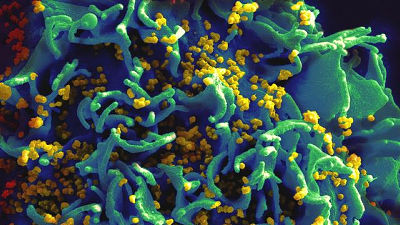WHO warns that the number of viruses resistant to anti-HIV drugs is increasing

by
Human immunodeficiency virus (HIV) is a dangerous virus that infects and destroys human immune cells and eventually causes acquired immunodeficiency syndrome (AIDS) . In recent years, the life expectancy of people infected with the HIV virus has increased due to the development of anti-HIV drugs, but the World Health Organization (WHO) has stated that 'the increase in viruses resistant to anti-HIV drugs has reached dangerous levels' And warning bells.
Alarming surge in drug-resistant HIV uncovered
https://www.nature.com/articles/d41586-019-02316-x
People who are infected with HIV receive treatment with anti-HIV drugs to control the growth of the virus and stop the onset of AIDS. If you continue to use a single anti-HIV drug, the virus will quickly become resistant, so at the site of treatment a method of combining multiple anti-HIV drugs ( cocktail therapy ) is used, but such Regardless of the method, WHO points out that more people are infected with viruses that are resistant to anti-HIV drugs.
From 2014 to 2018, WHO has 18 countries ( Honduras , Cuba, South Africa, Nicaragua , Papua New Guinea, Uganda , Namibia , Guatemala , Argentina, Zimbabwe , Esvatini , Nepal, Mexico, Cameroon, Brazil, Colombia, Myanmar, Vietnam). Conduct a survey of HIV-infected patients with drug resistance at randomly selected clinics. Of the HIV-infected people who started treatment during the period, we examined how many people hold a virus resistant to anti-HIV drugs.
The following image shows the results of the survey in 18 countries. The horizontal axis shows the proportion of infected people who are resistant to common anti-HIV drugs such as nevirapine or efavirenz . The red dot shows male and the green dot shows female, and the black dot shows the average of all subjects. Of the 12 countries surveyed, it is clear that more than 10% of newly started adults have drug resistant viruses. Overall, 12% of women surveyed and 8% of men were infected with anti-HIV resistant virus.

According to the WHO, it is considered dangerous to prescribe the same anti-HIV drug to other patients if more than 10% of those infected with anti-HIV drug resistance are infected. 'I believe that the rate of anti-HIV drug resistance has reached dangerous levels,' said
Also, in sub-Saharan Africa, there is an increasing number of HIV-infected infants have high levels of anti-HIV drug resistance. Of the infants diagnosed as having HIV in this area between 2012 and 2018, it seems that half of them have a virus that is resistant to one or both of nevirapine and efavirenz.

by
Sylvia Bertagnorio , a WHO infectious disease doctor, pointed out that the cause of the virus's drug resistance is unclear . On the other hand, Bertagnolio argues that stopping the treatment with anti-HIV drugs may have led to an increase in viruses that are resistant to anti-HIV drugs.
For example, a woman who has been treated to prevent HIV from becoming infected with her baby during pregnancy may stop taking anti-HIV drugs after delivery. Among women who had suspended treatment, the prevalence of viruses resistant to nevirapine or efavirenz was as high as 21%, and the prevalence of resistant virus among those who continued to take anti-HIV drugs (8 It is much higher than%).
As a reason for stopping taking anti-HIV drugs in the middle of treatment, it may be a big factor that shameful awareness that 'I do not want people to know that I'm taking anti-HIV drugs' may be a major factor, Mr. Is pointing out. In addition to this, it is possible that there is a physical cause of 'lack of medicine in the clinic'.
Given the growing number of people with anti-HIV drug-resistant viruses, WHO recommends the use of dolutegravir , which is more effective than other treatments and less likely to achieve drug resistance. In that case, he also argued that it is necessary to continue taking the medicine without stopping treatment on the way, Bertagnolio said.

by on xay
Related Posts:
in Science, Posted by log1h_ik







